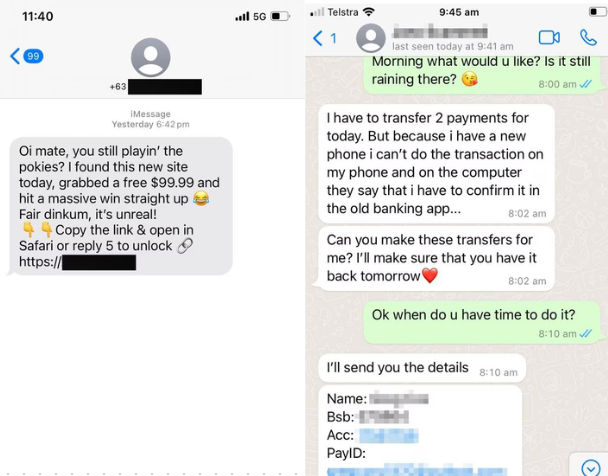
Australia’s laid-back friendliness is part of what makes life here feel welcoming and easygoing.
But what if that warmth could be weaponised—turned against you by someone pretending to be a mate?
A new wave of text scams is doing exactly that, catching Aussies off guard with messages that feel familiar, casual…and dangerously convincing.
The messages start innocuously, often with a cheerful ‘oi mate’ or a ‘true blue’ greeting.
Scammers are now using artificial intelligence to craft texts that sound strikingly like a genuine Aussie friend.
Telstra recently warned that these messages exploit our trust by weaving in local slang and casual conversational tones.
A typical text might read: ‘Oi mate, you still playin’ the pokies? I found this new site today, grabbed a free $99.99 and hit a massive win straight up. Fair dinkum, it’s unreal!’
The text usually ends with a suspicious link or an instruction to ‘reply 5 to unlock,’ both designed to reel victims into the scam.
How the Scam Works
The Australian Competition and Consumer Commission (ACCC) classifies these as betting and gambling scams—an especially deceptive form of investment fraud.
What makes them so effective is their exploitation of natural trust and familiarity.
Scammers can spoof phone numbers and sender IDs, even inserting fake messages into your legitimate message threads.
The use of AI to craft authentic-sounding Australian slang makes these scams far more believable than the poorly written texts of the past.
The Cost of Text Scams
In 2023, over 109,000 text messages were found to be misleading—a 37 per cent increase on the year before.
Australians lost roughly $26.9 million due to these scam texts alone.
Investment scams, including pokies schemes, are now costing more than any other type of fraud, contributing up to AU$3,800 lost every hour, according to the Australian Federal Police.
Scammers build trust by showing fake data or allowing small withdrawals, only to block access when victims attempt larger amounts.
This ‘mate’ tactic mirrors the earlier ‘hi mum’ scam, where scammers impersonated family members claiming urgent phone issues.
Spotting the Red Flags
Australians lost $2.6 million to ‘hi mum’ scams in 2024, with over 1,150 victims falling prey.
The pokies scam evolves this approach—exploiting casual mateship rather than parental concern.
Red Flags to Watch
If you receive a suspicious message, ACCC advises: delete it immediately, don’t click links or reply with numbers, contact the supposed sender via a known number, report it to Scamwatch, and contact your bank if you’ve shared personal information.
Government agencies, including the ACMA, have made disrupting SMS scams a priority for 2024-25.
Collaboration between multiple agencies is ongoing, but awareness remains the most effective defence.
Protect Yourself
Why Some Are More at Risk
Seniors may be particularly vulnerable due to greater trust in personal messages, less familiarity with scams, larger savings, or social isolation.
Understanding the tactics and sharing warnings with friends and family helps protect the community.
The ‘oi mate’ pokies scam represents a troubling new low—turning the friendliness that defines Australian culture into a trap.
What This Means For You
Scammers are now using AI to craft messages that include authentic Australian slang, making their texts seem friendly and genuine.
Pokies scams often promise massive wins and create a sense of urgency, encouraging recipients to act quickly without thinking.
Text scams are costing Australians millions each year, with investment scams now the most financially damaging type of fraud.
Older Australians may be particularly vulnerable due to their trust in personal messages, social isolation, and familiarity with casual communication.
Being aware of these tactics can help you stay one step ahead and protect your money and personal information from these increasingly sophisticated scams.
If you want to see another real-life example of how gambling scams can target unsuspecting people, there’s a story that highlights this issue in detail.
It shows how scammers are using similar tactics to exploit trust and lure victims into fake gambling schemes.
Reading about these cases can help you better recognise the warning signs and protect yourself from falling into the same trap.
Read more: 'Scambling' is an online gambling scam targeting First Nations communities
Australia’s laid-back friendliness is part of what makes life here feel welcoming and easygoing — Discusses the ‘oi mate’ pokies text scam and how scammers use AI and Australian slang to trick people.
https://www.news.com.au/technology/...m/news-story/c8ab42e09ebc775776edf58e110363c6
The days and times you're most likely to receive a scam text in Australia | SBS News — Explains that scammers are using generative AI to draft messages with Australian slang, making them appear more personable.
https://www.sbs.com.au/news/article...to-receive-a-scam-text-in-australia/9idp6670t
Text or SMS scams | Scamwatch — Details how scammers can spoof phone numbers and sender IDs, making messages appear in the same chain as legitimate contacts.
https://www.scamwatch.gov.au/types-of-scams/text-or-sms-scams
The days and times you're most likely to receive a scam text in Australia | SBS News — Reports that in 2023 over 109,000 misleading texts were detected, resulting in about $26.9 million lost.
https://www.sbs.com.au/news/article...to-receive-a-scam-text-in-australia/9idp6670t
Scams in Australia October 2025: types, latest cybercrime trends and how to protect yourself | TechRadar — Notes that scams contributed up to AU$3,800 lost every hour in 2023, highlighting the ongoing threat.
https://www.techradar.com/computing/cyber-security/scams-in-australia
Watch out for scam texts pretending to be from your telco | ACMA — Advises that suspicious links often contain misspellings or unusual characters designed to mislead recipients.
https://www.acma.gov.au/articles/2024-11/watch-out-scam-texts-pretending-be-your-telco
Scam alerts | Australian Taxation Office — Warns not to engage with any phone call, SMS, voicemail, email, or social media interaction claiming to offer easy money.
https://www.ato.gov.au/online-services/scams-cyber-safety-and-identity-protection/scam-alerts
Scam alert – 5 most common SMS impersonation scams | ACMA — Highlights that disrupting SMS scams impersonating well-known brands is a compliance priority for 2024-25.
https://www.acma.gov.au/articles/2024-09/scam-alert-5-most-common-sms-impersonation-scams
Have you received a message that seemed too friendly or too good to be true? Sharing your experience could help protect others in your community.







